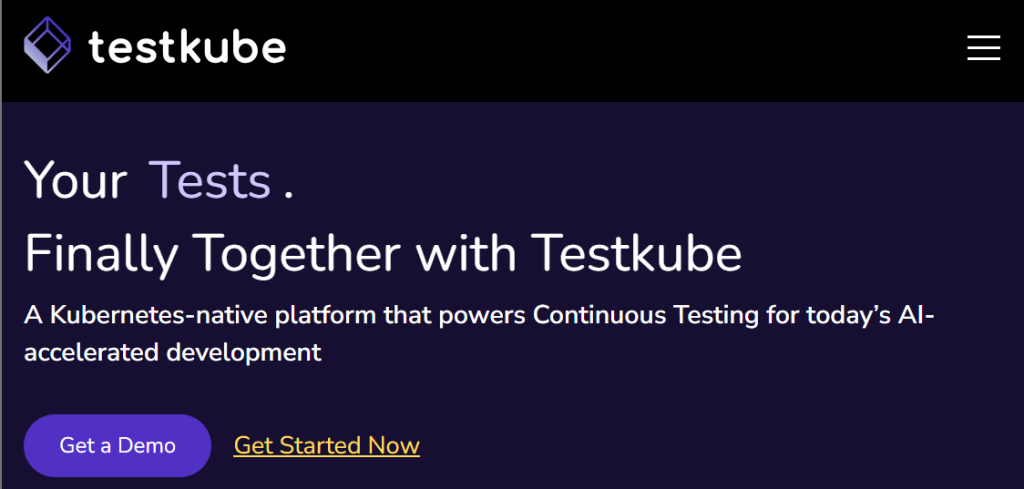Testkube Raises $8M Series A to Bring Kubernetes-Native Testing Mainstream
September 24, 2025
byFenoms Start-Ups

The Wilmington-based startup simplifies and automates testing for cloud-native teams, integrating directly with CI/CD pipelines to help developers ship reliable software faster.
Testkube, the Kubernetes-native testing framework, has secured $8 million in Series A funding to accelerate adoption of its testing platform built for cloud-native teams. The round strengthens Testkube’s position as the go-to solution for simplifying testing inside Kubernetes environments - long one of the most painful bottlenecks in cloud-native development.
With the funding, Testkube plans to expand its engineering and product teams, deepen integrations with popular testing frameworks like Postman, k6, and Cypress, and enhance its centralized dashboard and CLI.
Why testing needed disruption inside Kubernetes
Kubernetes may be the backbone of modern infrastructure, but testing within it has historically been messy, fragmented, and hard to scale. Teams often resort to custom scripting, complex pipeline hacks, or manual interventions that slow down releases and introduce risk.
Traditional testing frameworks were not built with Kubernetes in mind, meaning developers have had to bridge gaps themselves. This results in wasted engineering cycles and inconsistent reliability across deployments.
Testkube flips this model by embedding testing directly into Kubernetes, using native CRDs (Custom Resource Definitions) to make defining, running, and scaling tests seamless. By placing testing as close as possible to the infrastructure itself, Testkube ensures faster feedback loops, stronger reliability, and reduced operational overhead.
The founder’s perspective
Dmitry Fonarev, Testkube’s founder, brings decades of experience scaling teams and delivering enterprise software across the U.S., Europe, and Asia. With multiple exits, an IPO, and years of coaching and building high-velocity teams, Fonarev knows the pain points of DevOps at scale.
“For cloud-native teams, Kubernetes is where everything happens - but testing hasn’t caught up. Our mission is to make testing not just easier, but invisible. Teams should focus on shipping value, not wrestling with test scripts,” Fonarev explains.
This vision aligns with broader industry trends: developers want testing frameworks that integrate seamlessly with their pipelines, provide clarity through dashboards, and scale with modern infrastructure.
Where most teams underestimate testing’s role (value drop)
Founders and engineering leaders often treat testing as a cost center, something that “just needs to be done” to get to release. But here’s the overlooked reality: testing is not only about catching bugs - it’s one of the strongest levers for accelerating go-to-market and protecting brand trust.
When teams can test faster and more reliably inside their infrastructure, they can shorten release cycles dramatically. That speed doesn’t just save engineering hours - it lets companies outpace competitors by delivering features sooner, capturing market share earlier, and reducing downtime that could erode user trust.
Equally important: data from testing pipelines can become a strategic asset for product and customer teams, revealing how real-world usage aligns (or clashes) with expected performance. This insight informs product roadmaps, customer conversations, and even sales pitches. By embedding Testkube, companies turn testing from a silent expense into a market-facing differentiator.
Why Testkube is positioned to scale
Unlike one-off testing tools, Testkube is built as a framework. That means it doesn’t replace existing tools - Postman, k6, Cypress - but orchestrates and scales them natively inside Kubernetes. This makes adoption far easier for teams who already have established testing practices but need a way to scale without duct-taping solutions together.
The combination of a CLI, centralized dashboard, and Kubernetes-native CRDs provides developers and testers with flexibility: they can choose how deep to go without leaving their workflows. For enterprises moving toward cloud-native, this flexibility is crucial to balancing velocity with governance.
Backing and industry context
While Testkube’s Series A round did not disclose full investor details, the raise signals strong belief in a category that is gaining momentum: Kubernetes-native tooling. Investors have poured billions into cloud-native startups over the last five years, from monitoring and observability to developer experience platforms. Testing is the natural next frontier.
Fonarev’s proven record of exits, coupled with the team’s ability to simplify a notoriously complex pain point, makes Testkube a compelling bet in the cloud-native ecosystem.
Market outlook: cloud-native testing demand surges
The Kubernetes market itself is projected to reach $7.8 billion by 2030, growing at a CAGR of 23% (Grand View Research). As enterprises increasingly migrate workloads to Kubernetes, demand for native solutions that handle monitoring, observability, and testing is exploding.
Testing in particular is under pressure:
- According to GitLab’s 2024 DevSecOps Survey, 70% of teams cite testing as the biggest bottleneck in their CI/CD pipelines.
- Downtime caused by poor testing practices costs enterprises an average of $5,600 per minute (Gartner).
- Companies adopting Kubernetes-native DevOps practices report 20–40% faster release cycles compared to traditional approaches.
By embedding directly into Kubernetes, Testkube is tackling all three pain points - speed, reliability, and cost.
What’s next for Testkube
With its $8M Series A funding, Testkube will double down on product development and enterprise adoption. The roadmap includes tighter CI/CD integrations, expanded support for additional testing frameworks, and deeper observability features to help teams troubleshoot issues at scale.
In an era where speed and reliability define winners in software, Testkube’s promise is straightforward: make testing effortless inside Kubernetes so teams can ship faster, safer, and smarter.









